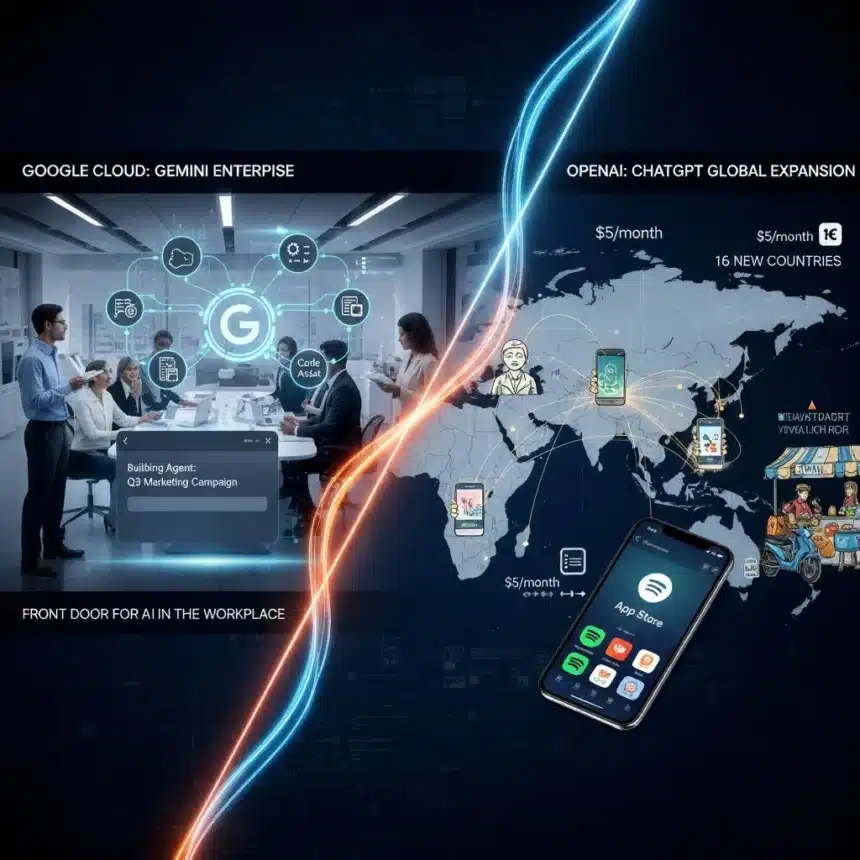Key Highlights
- Google launched Gemini Enterprise, a new secure AI agent platform under Google Cloud, to help businesses build and deploy custom AI assistants, competing with OpenAI and Anthropic.
- Gemini Enterprise allows AI agents to securely access and analyze data across internal systems
- OpenAI is expanding its affordable ChatGPT Go plan to 16 new Asian countries and evolving ChatGPT into an “operating system” with internal apps, reaching 800 million weekly active users.
- Both Google and OpenAI are aggressively expanding their affordable subscription plans globally as they battle for market share and work toward profitability in the booming AI industry.
The race to dominate the world of business and consumer Artificial Intelligence is heating up. Google and OpenAI are aggressively making moves to capture market share, with Google launching a comprehensive new platform for businesses and OpenAI rapidly expanding its affordable subscription plans across Asia.
Google’s Big Bet: Gemini Enterprise
On Thursday, Google officially introduced Gemini Enterprise, a brand new, secure platform under Google Cloud designed to be “the new front door for AI in the workplace.” This isn’t just a rebrand of existing tools; it’s a major step for Google as it seeks to compete directly with rivals like Anthropic and OpenAI in the enterprise market.
What is Gemini Enterprise?
Instead of being a simple add-on for Google Workspace, Gemini Enterprise is a separate, dedicated platform that functions as an AI agent toolkit. Essentially, it’s a powerful suite of tools that allows businesses to build and deploy their own specialized AI assistants—or “agents.”
These agents are designed to perform a wide variety of workplace tasks across departments like sales, marketing, finance, and HR. For the first time, Google is letting these AI agents securely access, combine, and analyze data from various sources within a single workflow.
This means a company’s custom AI agent can pull and analyze information from:
- Internal systems
- Google AI tools like Code Assist and Deep Research
- Google Workspace and Microsoft 365
- Business applications like Salesforce and SAP
All this work is managed through a central Gemini Enterprise chatbot. The platform also includes pre-built Google agents for research, a no-code tool for analyzing data and automating processes, and a central governance framework to visualize, secure, and audit all agents in one place.
Customers and Pricing
Google has already signed on major customers, including software design firm Figma, retail bank Macquarie Bank, buy-now-pay-later company Klarna, foodservice distributor Gordon Foods, and cruise line Virgin Voyages, which is using over 50 autonomous AI agents on the platform.
Gemini Enterprise is available in a few different pricing tiers:
- Standard and “Plus” editions: Start at $30 per seat per month (annual plan).
- Gemini Business annual plan: A cheaper option for small businesses or individual departments, costing $21 per seat per month.
OpenAI’s Global Push and Platform Shift
While Google focuses on the high-value enterprise market, OpenAI is focusing on massive global user growth and a dramatic platform evolution.
Expanding the Affordable Chatbot
OpenAI is rapidly expanding its affordable ChatGPT Go subscription plan, which costs under $5, into 16 new countries across Asia. This move is critical for gaining a foothold in high-growth markets where both companies are aggressively competing for users.
The ChatGPT Go plan gives users several benefits over the free version:
- Higher daily limits for messages, image generation, and file uploads.
- Twice as much memory for more personalized responses.
This expansion follows successful launches in India and Indonesia, where OpenAI has seen rapid growth and a doubling of paid subscribers. In select countries like Malaysia, Thailand, and Vietnam, OpenAI is even allowing users to pay in local currencies to make the service more accessible.
A New “Operating System”
OpenAI’s growth comes at a pivotal moment, with CEO Sam Altman announcing that ChatGPT has reached 800 million weekly active users globally.
At its DevDay 2025 conference, the company unveiled a major platform shift: introducing apps that work directly inside ChatGPT. This effectively transforms the chatbot into an ecosystem similar to an app store, with partners like Spotify, Zillow, and Coursera. The company’s vision is to evolve ChatGPT into an operating system where users can come to write, code, or interact with goods and services all through specialized applications within the chat interface.
The Race for Profitability
Despite its rapid growth and a $500 billion valuation, OpenAI reported a substantial $7.8 billion operating loss in the first half of 2025 due to heavy investment in AI infrastructure. Affordable subscription tiers like ChatGPT Go are seen as a crucial step toward achieving profitability while simultaneously expanding its global reach.
Similarly, Google is competing for the consumer market with its own, similarly priced Google AI Plus plan, which gives users access to its most advanced AI model, Gemini 2.5 Pro, along with creative tools for image and video creation.
The battle for the future of AI is now a two-front war: one for the enterprise backbone with sophisticated tools like Gemini Enterprise, and one for global consumer market dominance with affordable, rapidly expanding subscription services.










